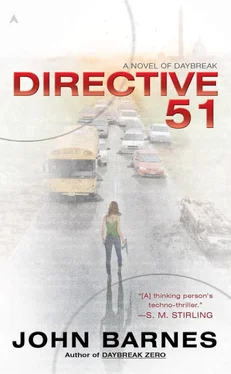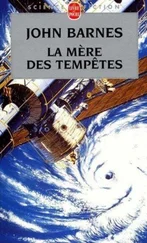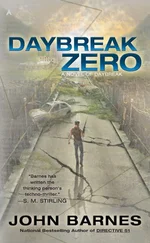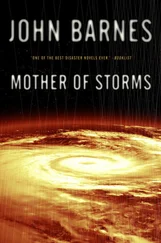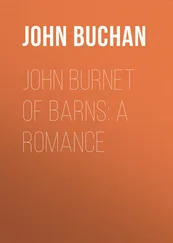“’Night, Heather. I’ll check in on you tomorrow.”
She didn’t even hear the door close.
THE NEXT DAY. NEWBERRY. SOUTH CAROLINA. 7:30 A.M. EST. TUESDAY. DECEMBER 3.
Manckiewicz had originally thought he would follow the interstates and skirt Atlanta as he had done Richmond, on his way down to Fort Benning. But he’d found that away from the big concrete ribbons, people were friendlier and barriers easier to pass, so he’d gone higher than and west of his original plan. Whenever he met a traveler headed back to Washington, he gave the traveler a hand copy of his writing so far on the trip, and told them to present it to George Parwin for a bath, bed, and meals. The endless hand-copying seemed to improve his style. I sure skip the clichés when I know I’ll be hand-copying them four or five times.
In Spartanburg, he’d heard that the refugee pulse from Atlanta had been far larger and more violent than anything he’d encountered before, probably because it was the biggest city he’d passed so far and its position next to the mountains narrowed the way out. He heard the fires to his west had been worse as well, so he had decided to go south through the space between Columbia and Augusta; both towns were apparently keeping it together, so there shouldn’t be more than occasional bandits—or the petty fortified houses that their right-wing-nut owners called Castles, which could make you just as dead if you walked into their territory before you knew where you were. Once he was well south of Atlanta, he’d cut west toward Fort Benning again.
He’d been pretty tired and his pack had been almost empty three days ago when he found work, helping to build a solar-hot-water setup for a businessman in Newberry, South Carolina. The guy was rigging up an abandoned hotel that had had water-radiator heating and cooling, not for travelers since there weren’t many yet, but figuring he’d be able to offer comfortable shelter once his water-driven machine shop was up and running, and that would be how he’d secure employees. “Sort of a company dorm,” he explained. “Got a guy talking with me about maybe building a little coal-gas or Brown-gas project to supply that hotel kitchen. I got a lot of belt-driven stuff out of two old closed factories, and I’m planning on waterwheels for small hydro.”
Newberry, Chris had written in his diary the night before, is one of a thousand small towns aiming to become one of the industrial centers for a new America. Collum Duquesne does not look at what is lost, but at what can be gained. He wants Newberry to have a newspaper because it would increase its influence in the region, and wants to help me find financing. Reluctantly, I told him I had decided to push on to Fort Benning; I’d rather be the paper, or at least a paper, for the capital of the United States.
Yet the spirit of the smaller cities that are seeing their chance…
When he had finished his entry, he’d carefully made three hand copies of it in case he ran into a traveler headed in the right direction. He’d been gratified, in North Carolina, when he’d found a week-old Advertiser-Gazette with his story about his passage around Richmond. He’d fantasized that when he arrived at Fort Benning, they’d have a complete run of the A-G , and he’d find all his stories there, along with a letter addressed to him demanding more.
Then he’d laughed at himself, packed what he had, including a big load of tradable canned food, blown out the candle, and gone to sleep. Now he was on his way out of Newberry, on the road to Fort Benning, aiming to cross the Savannah on the Thurmond Dam.
Houses and shops were getting fewer and meaner when something caught his eye on a side street. Weeds had already grown up around it, and the door hanging at a broken angle from the store was hardly unusual, but something—he approached more closely and saw what should have been impossible, unopened cans strewn around.
He trotted up the street and solved the mystery: the cans were labeled only in an alphabet that he thought must be Hangul. If the store was too far away from any Korean community, probably the people who looted it had only taken cans labeled in English, or with pictures of what they contained. He set to work stacking cans by matching characters; when each pile had a few of each different kind, he opened a can in each pile. The lychees were wonderfully refreshing, more for their liquid than the fruit itself; the second pile turned out to be a ferocious kimchi that he could only take one bite of before needing more lychees. The third held small, tightly-packed meat and vegetable rolls that were pretty palatable. When he was sure he understood what all the cans contained, he decided to take all the lychees, half the tinned fish, and some of those rolls; now his pack was well and truly topped up.
He was just crouching down to make sure his bag was properly balanced before tying it up, when a brilliant double flash of light, as if lightning had hit in the street just outside, froze him. He ran outside to look.
One giant sun rose in the north-northeast, and another in the northwest. Two great blinding balls of light, five times the width of the full moon, climbed up from the horizon. They were too bright to look at, and Chris covered his eyes belatedly, but though the fireballs had left his vision temporarily a red blur, he could tell as he blinked and the view of his palms slowly came back that he had been blessed, by being far enough away not to be blinded. The sense of heat from the fireball was like a very hot sun-lamp, but things were not bursting into flames, and his skin felt warmed, not burned.
Belatedly, through the fog of shock, his training from his days as a cam jock in Iran asserted itself. Nuke. Get away from windows and people. Slowed by his pack, he had covered four blocks when something slammed against his feet and made him stumble to his hands and knees; he’d lived in California long enough to think earthquake , and then to realize it was a big wave moving through the ground. Less than ten seconds later, another shock wave rolled under his feet. He was surrounded by cracking and crumbling sounds as walls broke, chimneys fell, window glass snapped in distorting frames, and utility poles tipped, cracked, and leaned crazily.
He turned and looked back. Where the fireballs had been there were now distinct mushroom clouds; I was right, it was two nukes. Wow, this is like video from Iran in 2018. The mushroom clouds looked funny, though, cut off at the tops, as if some god of the sky had simply dragged an eraser in a straight line over the tops of the clouds. Let’s see, the rule they gave me, the shock waves in the ground should travel at about ten miles every three seconds, so… but that makes no sense. It was at least three minutes, that would put the bombs… six hundred miles away. I shouldn’t be able to see the mushroom clouds or the light, let alone feel the shock waves in my feet! There are no bombs that big!
He’d been told, not for attribution, that Daybreak or il’Alb might have a new kind of nuke, but he’d had the impression it might be smaller, not bigger.
He had still not heard the sound. Sound travels at five seconds per mile; every Boy Scout learns to count one, Mississippi, two Mississippi, and divide by five to find out how far away the sound is. Figure three or four minutes had gone by and he had yet to hear the sound; and the sound should carry farther but slower than the ground shock, he thought, so he could not have missed it. Say four minutes. That was around fifty miles. More than fifty miles away… six hundred miles? That should take three thousand seconds, which would be fifty minutes, most of an hour. Well, if he heard a really big boom around forty-five minutes from now, he’d have to believe it. He looked down at the windup watch he’d found in a jewelry store and made a mental note.
Читать дальше
